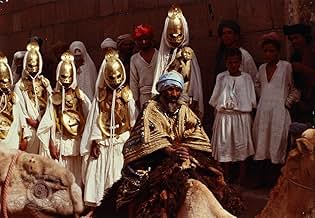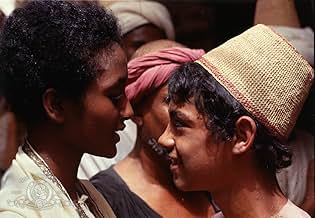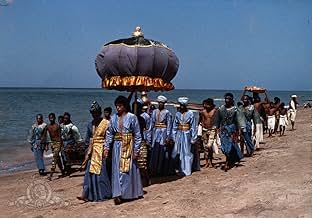AVALIAÇÃO DA IMDb
6,6/10
9,6 mil
SUA AVALIAÇÃO
Um jovem é escolhido por uma bela escrava para ser seu novo mestre; ela é sequestrada e eles devem procurar um ao outro. As histórias são contadas dentro de histórias; amor, viagens e os cap... Ler tudoUm jovem é escolhido por uma bela escrava para ser seu novo mestre; ela é sequestrada e eles devem procurar um ao outro. As histórias são contadas dentro de histórias; amor, viagens e os caprichos do destino.Um jovem é escolhido por uma bela escrava para ser seu novo mestre; ela é sequestrada e eles devem procurar um ao outro. As histórias são contadas dentro de histórias; amor, viagens e os caprichos do destino.
- Direção
- Roteirista
- Artistas
- Prêmios
- 1 vitória e 3 indicações no total
Tessa Bouché
- Aziza
- (as Tessa Bouche')
Margareth Clémenti
- Madre di Aziz
- (as Margaret Clementi)
Elisabetta Genovese
- Munis
- (as Elisabetta Vito Genovese)
Avaliações em destaque
Surely there's a lot to admire and enjoy in this movie: the settings and costumes are extremely colourful, the locations exotic, at times almost dreamlike, and at several times there are stunning mass-scenes. All this makes watching it a dazzling and overwhelming experience. But - at least with me - this movie also evokes bewilderment, confusion and irritation.
Using local amateurs can give a feeling of authenticity, but here is such an abundance of amateurism that it gets on your nerves. Many of the cast don't seem to act at all, but just obediently follow orders: they either loiter about or run around frantically, they grin sheepishly or feign to cry, they rattle their obviously later dubbed Italian lines in mostly loud and high-pitched voices, and then sooner or later (mostly sooner) they take their clothes off, that's about it. The musical score is very strange and uneven, at some parts beautiful music (Morricone!), at other times there are long streches of bland silence. Strangely enough never Arabian-sounding music, which couldn't have been hard to find around the locations where they filmed.
I don't mind a bit of nudity and sex, but this is really way over the top: every guy that pops around the corner is stark naked within a minute or two and runs around like that for the rest of the film. And mind you, this is a 1974 movie that actually won a renowned prize (in Cannes)! What on earth is the point of all this exhibitionism, there are numerous instances where there appears to be no functional motivation for it whatsoever.
Maybe Pasolini liked to create confusion and bewilderment. It's only a bit hard to admire this film for just that and for the enchanting cinematography.
Using local amateurs can give a feeling of authenticity, but here is such an abundance of amateurism that it gets on your nerves. Many of the cast don't seem to act at all, but just obediently follow orders: they either loiter about or run around frantically, they grin sheepishly or feign to cry, they rattle their obviously later dubbed Italian lines in mostly loud and high-pitched voices, and then sooner or later (mostly sooner) they take their clothes off, that's about it. The musical score is very strange and uneven, at some parts beautiful music (Morricone!), at other times there are long streches of bland silence. Strangely enough never Arabian-sounding music, which couldn't have been hard to find around the locations where they filmed.
I don't mind a bit of nudity and sex, but this is really way over the top: every guy that pops around the corner is stark naked within a minute or two and runs around like that for the rest of the film. And mind you, this is a 1974 movie that actually won a renowned prize (in Cannes)! What on earth is the point of all this exhibitionism, there are numerous instances where there appears to be no functional motivation for it whatsoever.
Maybe Pasolini liked to create confusion and bewilderment. It's only a bit hard to admire this film for just that and for the enchanting cinematography.
This was the penultimate film of the great Italian director Pier Paolo Pasolini. It also concludes his "Trilogy of Life", based on medieval story collections (the others are "The Decameron" and "The Canterbury Tales"). Like the others in the series, this is a portmanteau film (i.e. the film is not just one story but several).
The film begins with a young man's search for his slave girl lover, who has been abducted. Along the way, several stories from "The Arabian Nights" are told.
The film has a very loose structure. There are stories, within stories, within stories. This can be quite confusing at times. It was filmed in Iran, Yemen and Nepal and the countries look absolutely spectacular. The main flaw of the film is that it does show signs of being hastily cut (Pasolini himself reduced the film by half an hour before general release, and there may have been cuts due to the censors). This often makes the film seem quite disjointed. One of the dominant themes in this film is love and sex, and yes, there is a lot of explicit nudity here.
The film touches on dreams, reality, deception, truth, freedom and slavery. While by no means perfect, there are times when the Pasolini's genius and humanity shines through.
The film begins with a young man's search for his slave girl lover, who has been abducted. Along the way, several stories from "The Arabian Nights" are told.
The film has a very loose structure. There are stories, within stories, within stories. This can be quite confusing at times. It was filmed in Iran, Yemen and Nepal and the countries look absolutely spectacular. The main flaw of the film is that it does show signs of being hastily cut (Pasolini himself reduced the film by half an hour before general release, and there may have been cuts due to the censors). This often makes the film seem quite disjointed. One of the dominant themes in this film is love and sex, and yes, there is a lot of explicit nudity here.
The film touches on dreams, reality, deception, truth, freedom and slavery. While by no means perfect, there are times when the Pasolini's genius and humanity shines through.
There's a lot of potential moral quandaries associated with this movie: real animals getting killed, disturbingly young actors engaging in simulated sex acts, some unsettling adult themes and the general feeling of heat and stench conveyed by the flies and sweat. Then there's Pasolini's signature shaky camera-work and rough acting from non-actors.
If you can get past the thirty minute mark, and a few boring sequences, you may find yourself like I was charmed enough by its incidents that you keep watching to the end, waiting to see what surprise lay in store next.
It features some wonderful moments that suit the mythical source material, and as plentiful supply of penises there ever was, certainly if you count unique penises, I reckon this could beat most pornos, if that's your cup of tea. They're normally just sitting there, bear in mind, but often they're doing other things.
Not exactly family fare, but for those seeking a bit of weirdness, this may just hit the right spot. It would probably be hilarious if dubbed over Kung Pow style. (Or What's Up Tigerlilly style if you prefer).
5/10 for me.
If you can get past the thirty minute mark, and a few boring sequences, you may find yourself like I was charmed enough by its incidents that you keep watching to the end, waiting to see what surprise lay in store next.
It features some wonderful moments that suit the mythical source material, and as plentiful supply of penises there ever was, certainly if you count unique penises, I reckon this could beat most pornos, if that's your cup of tea. They're normally just sitting there, bear in mind, but often they're doing other things.
Not exactly family fare, but for those seeking a bit of weirdness, this may just hit the right spot. It would probably be hilarious if dubbed over Kung Pow style. (Or What's Up Tigerlilly style if you prefer).
5/10 for me.
Pasolini is a wonderful, wonderful adventure. Welcoming him into your heart is not without cost; he's a friend who is brilliant on one side and captive to banality on the other.
The bad? Well, its tolerable for me because it is so flamboyantly obvious. The man has a triple curse: he is outrageously gay, he is insufferably Italian and (perhaps because of these two) he has excessively simpleminded storytelling skills. The stories here in their individual content have juvenile dynamics. The way the emotions are handled is comically simpleminded.
That's in the nature of the stories of course, but our man here takes them seriously, so overlain on this is his own sexual nature. These stories are, some of them, erotic in nature and all of them have desire as the driver. Among the various stories, he's chosen these and that's fine enough. The original stories were distributed in places all over the Islamic world, a huge reach, but all of them which included sex joked about the dissonance between Islmac attitudes towards sex and the actual lives of folks within.
But its rather interesting actually watching how his own predilections enter the story. Most of the men here are slaves to their own desires. But those desires are all in the stories skipping over the most superficial of erotic notions. A teenage boy awakes and finds an unconscious teenage girl next to him. He has sex with her. This is equated to "falling in love." It happens over and over and if you encounter these stories in text, its part of the fun.
But see how Pasolini himself enters the story in how he chooses to portray the erotic content. Nudity and youth stand for the erotic, especially the nude boy. When sex is depicted (less than you would expect from the stories) its amazing wooden, mannikins. I suppose if you made some still images of parts of this it would be erotic, but repeatedly seeing the male member of a cartoon tells me that director has the same foibles as the characters we see.
The Good? Well there's more than enough of that to make up for the sexual inadequacies of that part of the world.
There's the absolute beauty of the thing cinematically. It isn't fully cinematic in motion, since Pasolini has no notion of how things flow, what the rhythms of things are. But each shot is fulfilling and some are absolutely breathtaking. He doesn't have any static tableaux like the striking ones in "Matthew," but the visual elegance is erotic in itself. Its a sort of continuous penis shot of life, and you'll find the beauty of the places erotic in their own ways, And then there's the way the stories are crafted.
Yes they are cartoonish. Yes, they have execrable pacing, almost as if they were found objects and put in inappropriate boxes. But the way they are tied one to another is nothing short of brilliant. If we had none of the beauty, and none of the amusement of watching an Italian fop struggle on screen, we'd still have this. And its great.
There isn't any one mechanism that links the stories; there may be a dozen. There isn't any sense to about half of them, and that's part of the miracle. Sometimes they are inside one another, but sometimes they walk through each other. Sometimes it is the same place of extras. Sometimes a repeated situation; "don't eat from that plate." Sometimes it is simply a segue that has no narrative connection at all but just seems nested or siblinged in some way. Its "Sarogossa Manuscript" with fun and beauty.
I must say that one story really is perfect. It alone has two really beautiful women acting erotically. It has expert pacing. It is funny: laugh out loud funny. And it has a punishment that is one of the most arresting images you'll see if you are a guy. Plus it has a framing story that makes me think it was the first one adapted and filmed.
Ted's Evaluation -- 3 of 3: Worth watching.
The bad? Well, its tolerable for me because it is so flamboyantly obvious. The man has a triple curse: he is outrageously gay, he is insufferably Italian and (perhaps because of these two) he has excessively simpleminded storytelling skills. The stories here in their individual content have juvenile dynamics. The way the emotions are handled is comically simpleminded.
That's in the nature of the stories of course, but our man here takes them seriously, so overlain on this is his own sexual nature. These stories are, some of them, erotic in nature and all of them have desire as the driver. Among the various stories, he's chosen these and that's fine enough. The original stories were distributed in places all over the Islamic world, a huge reach, but all of them which included sex joked about the dissonance between Islmac attitudes towards sex and the actual lives of folks within.
But its rather interesting actually watching how his own predilections enter the story. Most of the men here are slaves to their own desires. But those desires are all in the stories skipping over the most superficial of erotic notions. A teenage boy awakes and finds an unconscious teenage girl next to him. He has sex with her. This is equated to "falling in love." It happens over and over and if you encounter these stories in text, its part of the fun.
But see how Pasolini himself enters the story in how he chooses to portray the erotic content. Nudity and youth stand for the erotic, especially the nude boy. When sex is depicted (less than you would expect from the stories) its amazing wooden, mannikins. I suppose if you made some still images of parts of this it would be erotic, but repeatedly seeing the male member of a cartoon tells me that director has the same foibles as the characters we see.
The Good? Well there's more than enough of that to make up for the sexual inadequacies of that part of the world.
There's the absolute beauty of the thing cinematically. It isn't fully cinematic in motion, since Pasolini has no notion of how things flow, what the rhythms of things are. But each shot is fulfilling and some are absolutely breathtaking. He doesn't have any static tableaux like the striking ones in "Matthew," but the visual elegance is erotic in itself. Its a sort of continuous penis shot of life, and you'll find the beauty of the places erotic in their own ways, And then there's the way the stories are crafted.
Yes they are cartoonish. Yes, they have execrable pacing, almost as if they were found objects and put in inappropriate boxes. But the way they are tied one to another is nothing short of brilliant. If we had none of the beauty, and none of the amusement of watching an Italian fop struggle on screen, we'd still have this. And its great.
There isn't any one mechanism that links the stories; there may be a dozen. There isn't any sense to about half of them, and that's part of the miracle. Sometimes they are inside one another, but sometimes they walk through each other. Sometimes it is the same place of extras. Sometimes a repeated situation; "don't eat from that plate." Sometimes it is simply a segue that has no narrative connection at all but just seems nested or siblinged in some way. Its "Sarogossa Manuscript" with fun and beauty.
I must say that one story really is perfect. It alone has two really beautiful women acting erotically. It has expert pacing. It is funny: laugh out loud funny. And it has a punishment that is one of the most arresting images you'll see if you are a guy. Plus it has a framing story that makes me think it was the first one adapted and filmed.
Ted's Evaluation -- 3 of 3: Worth watching.
"Fiore delle mille e una notte" ,which won special prize at CANNES 1974 is the third part of what Pasolini called the trilogy of life which encompasses "il decameron" (1971) and" racconti di Canterbury" (1972). It's the most accessible of all Pasolini movies ,and weren't it for the numerous nudities,it would appeal to large audience.
This must be the script:it's much better than the two first films because the story is built à la Shéhérazade ,with plots ,subplots and subsubplots which fit into each other;and although sex is the main vector,it features enough twists to sustain the interest throughout.It does not forget magic (the segment which features Ninetto Davoli,Pasolini's favorite actor,uses a lot of symbols)and mystery (the adolescent who must be killed when he's fifteen ).Humor is less vulgar than in "di racconti di Canterbury" The little riddle "the aromatic grass of the fields" "the slit pomegranate" and "the inn of the warm welcome " is witty.
Little did we know that Pasolini would follow his trilogy of life with the most depressing work ever made :"Salo" (1975).
This must be the script:it's much better than the two first films because the story is built à la Shéhérazade ,with plots ,subplots and subsubplots which fit into each other;and although sex is the main vector,it features enough twists to sustain the interest throughout.It does not forget magic (the segment which features Ninetto Davoli,Pasolini's favorite actor,uses a lot of symbols)and mystery (the adolescent who must be killed when he's fifteen ).Humor is less vulgar than in "di racconti di Canterbury" The little riddle "the aromatic grass of the fields" "the slit pomegranate" and "the inn of the warm welcome " is witty.
Little did we know that Pasolini would follow his trilogy of life with the most depressing work ever made :"Salo" (1975).
Você sabia?
- CuriosidadesThis film is the final entry in director Pier Paolo Pasolini's "Trilogy of Life," following O Decameron (1971) and Os Contos de Canterbury (1972).
- Erros de gravaçãoWhen the chimpanzee is writing, it's clearly visible that it's not actually the chimp writing but an actor wearing a glove made to look like the chimp's hand.
- Cenas durante ou pós-créditos"Truth lies not in one dream, but in many." - Arabian Nights
- Versões alternativasThe 1990 Water Bearer Films video release (WBF 8001) is marked "Original Uncut Version" with a runtime of 133 min. It is rated X.
- ConexõesEdited into Porno & libertà (2016)
Principais escolhas
Faça login para avaliar e ver a lista de recomendações personalizadas
- How long is Arabian Nights?Fornecido pela Alexa
Detalhes
- Data de lançamento
- Países de origem
- Idiomas
- Também conhecido como
- Las mil y una noches
- Locações de filme
- Mesjed-e-Imam, Esfahan, Irã(Zumurrud's palace)
- Empresas de produção
- Consulte mais créditos da empresa na IMDbPro
Bilheteria
- Faturamento bruto mundial
- US$ 755
- Tempo de duração2 horas 10 minutos
- Mixagem de som
- Proporção
- 1.85 : 1
Contribua para esta página
Sugerir uma alteração ou adicionar conteúdo ausente


























